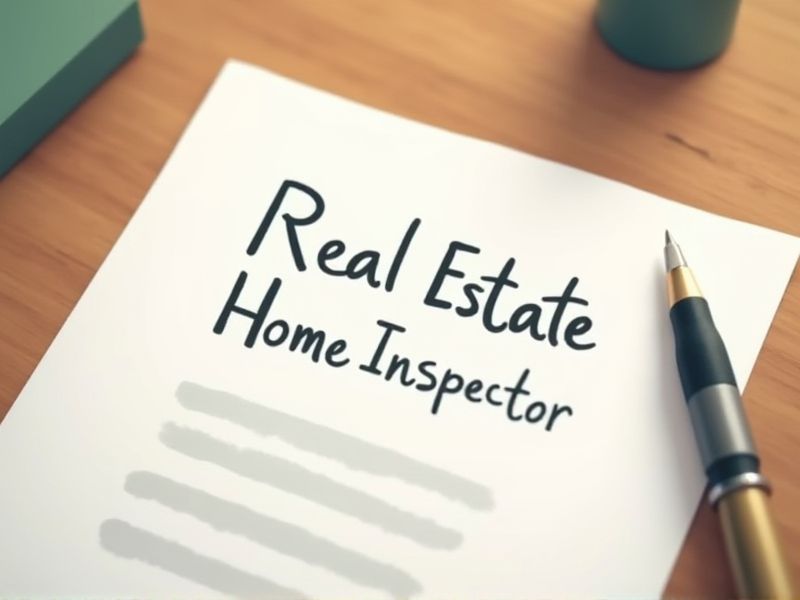
Home inspectors play a crucial role in the real estate process by ensuring that properties meet safety and quality standards. Certifications verify an inspector's proficiency in assessing structural integrity, electrical systems, and other essential components of a home. They also enhance credibility and trust with clients, leading to better professional opportunities. These are some key certifications needed for a career as a Real Estate Home Inspector.
National Home Inspector Examination (NHIE) Certification
NHIE certification ensures a standardized level of competence and professionalism among home inspectors, directly leading to increased consumer trust. Certified inspectors are more likely to identify critical issues in properties, potentially saving buyers from future costly repairs. The certification often becomes a benchmark for employers and clients seeking reliable and qualified services in the real estate market. Home inspectors with NHIE certification can access more professional opportunities and higher earning potential compared to those without.
American Society of Home Inspectors (ASHI) Certification
The ASHI certification provides a standardized level of competence and professionalism for home inspectors, ensuring they meet rigorous industry standards. When inspectors earn ASHI certification, they gain credibility, which enhances client trust and can lead to more business opportunities. As the real estate market is competitive, having ASHI certification often becomes a requirement set by real estate agents and clients who prioritize quality inspections. Additionally, ASHI-certified inspectors benefit from continuous education and resources, keeping them updated with changes in inspection practices and technologies.
InterNACHI Certified Professional Inspector
InterNACHI certification ensures that home inspectors adhere to industry-leading standards, which instills trust among homebuyers and real estate agents. With rigorous education and training requirements, certified inspectors are better equipped to identify potential issues in a property, reducing the risk of costly surprises for buyers. The certification also emphasizes ongoing education, keeping inspectors updated on the latest building practices and regulations, thus maintaining inspection quality over time. Employing an InterNACHI Certified Professional Inspector can increase the perceived value of a real estate company's offerings, supporting smoother transactions and client satisfaction.
Certified Master Home Inspector (CMHI)
A Certified Master Home Inspector (CMHI) offers enhanced credibility, attracting more clients due to recognized expertise. This advanced certification often leads to more reliable inspections, as CMHIs bring extensive experience and ongoing education to their evaluations. CMHIs adhere to a higher standard of ethics, which can reduce liability risks for real estate transactions. With their advanced knowledge, CMHIs can identify potential issues early, providing clients with critical information for informed decision-making.
EPA Lead Renovation, Repair and Painting (RRP) Certification
The EPA Lead Renovation, Repair and Painting (RRP) Certification is needed for real estate home inspectors to ensure compliance with federal regulations protecting clients from lead exposure. Homes built before 1978 often contain lead-based paint, posing health risks if disrupted during inspection. With the certification, inspectors can accurately assess and manage lead hazards, providing safer advice and recommendations. This certification also enhances the inspector's credibility and broadens their scope of practice within real estate transactions.
Certified Infrared Thermographer (CIT)
Certified Infrared Thermographers (CIT) provide accurate thermal imaging, identifying potential issues such as water intrusion or insulation gaps that may not be visible to the naked eye. Detecting these issues early prevents costly repairs and enhances a property's safety and energy efficiency. Real estate home inspectors equipped with CIT skills gain a competitive edge in the market, offering comprehensive evaluations. Advanced detection leads to informed decision-making for buyers and reduces liability risk for sellers.
Certified Mold Inspector (CMI)
Certified Mold Inspectors possess specialized knowledge in identifying mold issues, which impacts property value. Mold presence often leads to significant health concerns, making accurate detection crucial for homebuyers. Inspections by CMIs provide more comprehensive evaluations, resulting in fewer legal liabilities for real estate transactions. Home inspector reports with mold assessments build buyer trust and expedite sales processes.
Certified Radon Measurement Technician (CRM)
Certified Radon Measurement Technicians are crucial for real estate home inspections because radon is a colorless and odorless gas that can pose significant health risks when elevated levels are present indoors. By ensuring accurate radon measurements, technicians protect potential homeowners from long-term exposure, which is linked to lung cancer. Integrating CRM expertise in home inspections offers a comprehensive assessment of the property's air quality, potentially influencing buyer decisions and property value. State regulations often require certified professionals to conduct radon testing, ensuring compliance and accountability in real estate transactions.
Certified Roof Inspector (CRI)
Certified Roof Inspectors (CRI) bring specialized expertise which enhances the accuracy of real estate inspections by accurately identifying roof-related issues. Their certification often leads to early detection of potential problems, potentially saving homeowners from costly repairs down the line. Roofing components are complex, and a CRI can ensure that all nuances are thoroughly evaluated and reported. In the real estate market, this level of detailed inspection can increase buyer confidence and bridge the trust gap between sellers and buyers.
Certified Building Envelope Inspector (CBEI)
Certified Building Envelope Inspectors (CBEI) identify potential building envelope issues, ensuring property safety and longevity. Their expertise addresses energy efficiency concerns, leading to reduced utility costs for homeowners. They provide in-depth analysis of moisture intrusion risks, preventing costly structural damage. Incorporating a CBEI into real estate inspections enhances property valuation and marketability.
Summary
By earning certifications, you can significantly enhance your credibility as a home inspector in real estate. This credibility often leads to an increase in the number of clients who trust your expertise during property evaluations. Certification also equips you with updated knowledge and advanced skills, enabling you to deliver more accurate and comprehensive inspections. Consequently, a certified inspector can typically command higher fees and experience overall business growth.
